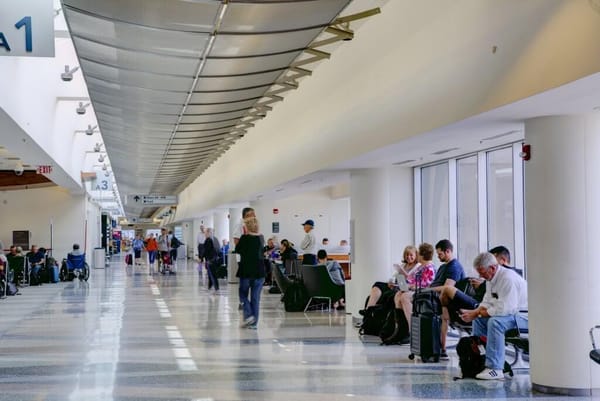Humana billing dispute blocks access to vision surgery for Kentucky seniors across the state





The impact has been swift and severe, according to the Kentucky Academy of Eye Physicians and Surgeons, with dozens of ophthalmology practices impacted across the state.
"I'm Shay McAlister, and this is Shay Informed: an independent, ad-free platform dedicated to honest journalism with compassion and clarity.
Are you new here? Sign up for the free newsletter or subscribe to support our mission.
Some Kentucky ophthalmologists say they've been forced to deny patients critical cataract surgery after Humana Medicare Advantage stopped paying for the procedures months ago, leaving practices across the state scrambling and patients without access to one of the most common surgeries in the country.
Dr. Ryan Smith, a cataract and glaucoma surgeon at Eye Consultants Kentucky in Lexington and president-elect of the Kentucky Academy of Eye Physicians and Surgeons, says his practice hasn't received payment for a single cataract surgery or related laser procedure from Humana since the beginning of July.
"100% of those codes have not been paid since July 1," Smith said during an interview. "Our typical routine for these type of cases is when we submit the bill to the insurance company, they pay us somewhere between 10 to 14 days later. That's the routine. And in our instance, obviously that's not occurring."
Smith says he has been forced to tell Humana patients he can't schedule their surgeries until the company pays outstanding claims.
"I started that last week," Smith said. "Actually, I had a Humana patient who has cataracts, who I told them, I can't schedule your surgery until I'm paid."
What initially appeared to be an isolated billing issue has grown into a statewide crisis, according to Dr. John Franklin, current president of the Kentucky Academy of Eye Physicians. Since the organization began reaching out to members, they've heard from practices in Georgetown, Lexington, Louisville, Campbellsville, Ashland, Somerset, London and Hazard- all reporting the same problem.
"From what I can tell, I don't know of a single practice that has been paid since July 1 for any of these procedures," Smith said.
The timing couldn't be worse for patients who need the surgery. Cataract surgery primarily affects older adults- exactly the demographic most likely to have Medicare Advantage plans like Humana.
"Most of the time, but you can have cataracts from complications from diabetes or from trauma," Franklin explained about who needs the surgery. "The majority of them are going to be people above 60."
For patients who need cataract surgery, delays can have serious consequences beyond just poor vision. Franklin explains that a cataract is simply a clouding of the lens inside the eye that becomes more opaque with age.
"The reason that you'd want to have the cataract removed is just to be able to have better vision again," Franklin said.
But for older patients, especially, the stakes are higher than just clearer sight.
"The vision impairment can lead to falls. It can lead to potential loss of their driver's license, it can lead to loss of autonomy," Smith said. "Worldwide, cataracts are probably the leading cause of blindness."
Patients caught in the middle have few alternatives. Franklin says academic medical centers like the University of Kentucky appear to still be getting paid by Humana, but that would require patients to switch from their established private practice doctors to enter a healthcare system they might not already be part of.
For now, Smith tells affected patients they'll have to wait.
"I tell them right now, we're on pause. I want to take care of you when I get the surgery done. I can't continue to do this for free, and so we're going to pause until we figure this out with Humana," Smith said.
Frustrated by what they describe as stonewalling from Humana representatives, Kentucky ophthalmologists have taken their concerns to federal lawmakers. Both Senator Rand Paul's and Senator Mitch McConnell's offices have been contacted, according to Smith.
"Senator Rand Paul's office obviously, being an ophthalmologist, is acutely aware of what's going on, which has been helpful," Smith said.
Representatives Andy Barr and Brett Guthrie have also been contacted about the issue.
"We have reached out multiple times to multiple different individuals" at Humana, Smith said. "The problem is when you start getting into their phone tree, then the next time you're on call with someone, they don't know what has gone on before, and so you're just constantly dealing with a morass of people not sure what's happening."
While the scale of the current problem is unprecedented, Smith says there have been warning signs. In December 2024, his practice experienced similar payment delays from Humana for different procedure codes.
"It was not for this code, but it was for something similar, where they just decided not to pay for a certain code," Smith said. That issue was resolved within about a month, he said, but "nothing to this length or this egregious or this widespread."
The Kentucky Academy of Eye Physicians and Surgeons is directing both patients and providers to file reports with the Kentucky Department of Insurance while continuing to advocate for a resolution.
For Smith, the situation feels personal.
"I just feel very let down that a Kentucky-based organization has somehow managed to affect essentially every Kentucky ophthalmologist and their constituents," he said. "It really bothers me that from what I can tell, there's no recourse other than reaching out to a federal legislator to fix the issue, because internally, there does not seem to be a way to do it with the company."
I reached out to Humana directly to find out more about the explanation behind the denials. A spokesperson shared the following statement with me:
We are committed to ensuring our members receive the care they need. While we cannot discuss the specifics of this situation due to HIPAA and other privacy laws, Humana is proactively working with the provider to resolve the matter.
The statement didn't explain what had happened or why.
But within hours of my communication with Humana, Dr. Smith said he was able to connect with the healthcare giant and get an explanation for the first time in the three months since this started.
Smith said, "Their representative confirmed with me that they used a third-party AI claims processing service, which is what caused the issue. She also stated that they would be paying out claims that have been in the system." But they gave no time frame for those payouts, and Smith said he has not been paid as of Thursday morning.
"I do not want these multi-billion dollar corporations to get away with activities that are 'AI' generated when leading to delay in care for the constituents of Kentucky," Smith said.
The Kentucky Academy of Eye Physicians and Surgeons recommends that patients and providers reach out to the Kentucky Department of Insurance to file a report if they are being impacted.
Like what you see? Learn more about Shay Informed here! This is honest journalism with compassion and clarity.








